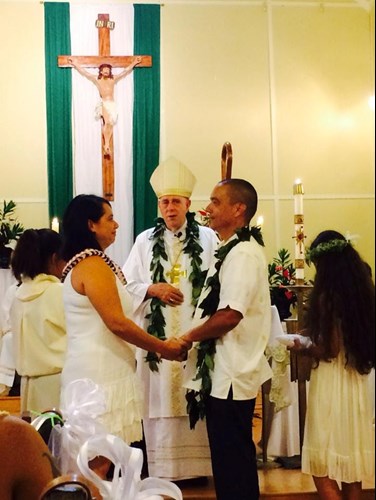Phone: (808) 585-3300 Fax: (808) 545-5063
Roman Catholic Church in the state of hawaii
Diocese of Honolulu
Witness to Jesus
Diocesan Offices

Help me find...
- Diocesan Offices
- Bishop of Honolulu
- Deacon Formation
- Diocesan Tribunal & Canonical Affairs
- Facilities Management
- Finance Office
- Hawaii Catholic Conference
- Hawaii Catholic Herald
- Hawaii Catholic Schools
- Hospital Ministry
- Human Resources
- Land Asset Management Office
- Office for Social Ministry
- Office of Clergy
- Office of Evangelization and Catechesis
- Office of the Chancellor
- Office of the Vicar General
- Office of Vocations
- Office of Worship
- Office of Youth & Young Adult Ministry
- Permanent Deacons
- Prison Ministry
- Respect Life
- Safe Environment - Child and Youth Protection
- Saint Stephen Diocesan Center
- Stewardship & Development
- Home
- >
- Diocesan Offices
- >
- Diocesan Tribunal & Canonical Affairs
- >
- Validations of Mere Civil Marriages
- >
Marriage Validations
Simple Validations:
Catholics are required to marry in the Catholic Church, even if a Catholic is marrying a non-Catholic. If a Catholic gets married outside of the Catholic Church and with no prior dispensation from canonical form, the marriage is juridically inefficacious due to the lack of the required canonical form. That is, the marriage is not recognized as existing in the eyes of the Church.
In order to remedy this situation, the following are ordinarily required:
- The couple fulfills marriage preparation requirements and completes with the priest or deacon all of the usual pre-marriage paperwork. The couple goes through a marriage ceremony in the Catholic Church.
- In the eyes of the Church, this is considered the marriage ceremony, with the first one having no recognition.
- The ceremony can be very simple, with just a priest or deacon and two witnesses being present.
- However, some couples decide to have a full-blown wedding ceremony. This is also acceptable.
Bishop Larry Silva celebrating a marriage validation. |
Yet sometimes, there might be reasons to not go through a new ceremony. If such reasons exist, the Church has available an alternative — a radical sanation.
Radical sanations:
- A rescript is issued by the bishop (or his delegate) which accepts the original consent of the parties from the time of the original marriage ceremony. (In the Diocese of Honolulu, radical sanations are issued by the director of canonical affairs.) Click here for the petition.
- The rescript confers retroactive validity on the marriage, back to the time of the original marriage ceremony.
- The parties must still intend to be married to each other.
- No new marriage ceremony takes place, although the couple must still fulfill the usual pre-marriage paperwork and suitable marriage preparation requirements.
- A serious reason is needed for a radical sanation to be granted.
What are some reasons to seek a radical sanation?
Example 1: Sally is Protestant and Juan is Catholic. They married in a service in Sally's Protestant community but with no dispensation from Juan's Catholic bishop. Now Juan finds out that he cannot receive Holy Communion when he attends Mass because his marriage is not recognized by the Catholic Church. But Sally sees no reason to go through a new marriage ceremony in a Catholic Church because she believes that she is already married. Juan talks to his priest about the situation and his priest suggests a radical sanation.
Example 2: Malia is not baptized and Joe was baptized as a Catholic but a priest yelled at him once and now he refuses to have anything to do with the Catholic Church. Malia and Joe marry before a judge. Now, however, Malia discovers the joys of the Catholic faith and wants to be baptized. However, the deacon in her parish, who directs the RCIA program, tells her that her marriage is not recognized by the Catholic Church and that she needs to get the marriage validated. Malia is upset because she knows that Joe will never go through a marriage ceremony in the Catholic Church. So the deacon suggests a radical sanation.
(A radical sanation can also be used to correct mistakes, such as when the priest or deacon forgets to secure a needed dispensation from disparity of cult, or when the priest or deacon did not receive proper delegation to assist at the marriage.)
How do I get a radical sanation?
The priest or deacon should send to the Office for Canonical Affairs the following:
- The complete pre-nuptial paperwork (e.g., prenuptial investigation, authentic recent baptismal certificate(s), proof of non-Catholic baptism, dispensation/permission form, affidavits of freedom to marry, etc.).
- A signed petition by one of the parties to the marriage or the priest or deacon as to the reason for the sanation.
Are there situations when it is not possible for the bishop (or his delegate) to grant a radical sanation?
Yes. The most common situation is if one party had a prior valid marriage which overlaps the time of the second marriage.
For example, Paulo marries Jane in 1985, but they divorce in 1990. (Both are Catholic and the marriage took place in the Catholic Church, so the marriage is presumed valid until death.) Then Paulo marries Elizabeth in 1995 in a civil ceremony. (This marriage is not recognized by the Catholic Church because of the lack of canonical form and because of his prior bond to Jane.) Then Jane dies in 2000. At this point, Paulo is free to get his current marriage to Elizabeth validated. However, he cannot get a radical sanation from the bishop because there were five years when the second marriage to Elizabeth overlapped the time when his first spouse, Jane, was still alive.

